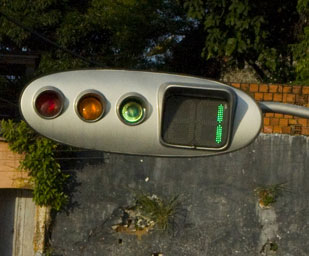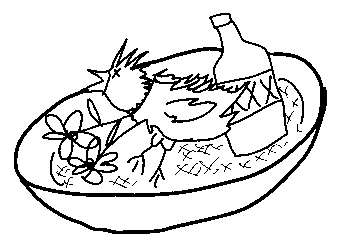Arrival in Salvador
It was late when we arrived in Salvador, but of course we had gotten a second wind for the obvious reasons. On the way to Carol’s house from the airport, we ran into a couple of Bahian oddities (Bahia is the state Salvador is in. Like Alabama only, uh, bigger): First, Carol would run red lights on a whim. She explained that at that time of night, the driver could use his own judgment about whether to stop or not. The traffic police were really laid back. WOW! What a concept. We also saw that the traffic lights had a countdown monitor that told how long it would be before the light would change.

The second oddity came in the form of a dead chicken and a bunch of fruit and flowers in a bowl by the side of the road. At an intersection, actually, as Carol told us. It’s called a bozó, and it’s part of a traditional Candomblé (a religion of the Yoruba tribe) rite for good luck or spirit warding or something.
She said that sometimes they’ll put liquor in there, but I would be of the mind to ward off my own spirits with my own spirits. Give the gods the chicken and fruit.

Things were already beginning to button up for Carnaval, and we saw that streets were already being blocked, even though the festival beginning was two days away. We encountered one of these flimsy blockades–a couple of big cones, actually. Carol pointed out that we needed to go through there to get to her house. Bolstered by her description of lax traffic police, I jumped out of the car and began moving the cones.
Immediately, a couple of guys with temporary vests on came running to the car to see what we were up to. Carol explained to them in [what I thought at the time was] flawless Portuguese. They smiled, gave us the thumbs up (Brazil’s favorite sign, and very addictive) and waved us on our way. We began winding up a long hill in the Rio Vermelho section when we came to a gate and a gatekeeper. He gave the thumbs up to Carol, raised the gate, and we pulled up next to the first house on the left.
Wow! Security and everything. She explained that the neighborhood employed security after a few incidents had spoiled their peace of mind. It seemed to be an ordinary necessity of living in the city.
The house was incredible. Built in the 60’s, it was three levels of great taste in decorating and function with a ventilation system that made the hot Brazilian summer still hot, but more bearable. Oh yeah, I was hot, all right. Perpetually hot. I quickly realized that the house wasn’t air conditioned, but the bedrooms were. I found out that electricity is so expensive in Brazil that central air is out of the question for all but some public buildings and the ridiculously rich.
We went downstairs to the huge indoor/outdoor first floor of the house: open on the periphery, but covered in the middle. A couple of lanais were draped with blooming vines. The stonework was incredible, and it was then that we discovered that most of the granite in the world comes from Brazil. The variety and installation differences were stunning.
Carol fixed us a delicious cacophony of Brazilian drinks with fresh fruit: (she tells me umburoska, aceroloska, and cajuroska, It was totally sublime, especially after the TAM-athon we had been through that day.
We were staying in Daniel’s room, so we turned our AC on to cool the room off. The Kennemers would stay in the guest room. Daniel was staying in the den, and didn’t seem to mind giving up his room at all. I realized on our last day why he loved it in there so much. It was dark, and it was like an icebox in the small space when he turned on the AC. It was Heaven.
Before we went to bed, Carol came in to explain the toilet. We didn’t really need any help with that, per se, but she explained that in Brazil, the plumbing and sewer systems are less than stellar. For that reason, the custom is that most Brazilians don’t flush toilet paper. They put it in a nice garbage can with a lid on it right next to the toilet.
Carol dropped that bomb first, watched our eyes bulge out, then followed it with a quick: “but we Cerqueiras flush toilet paper. Oh yes we do. And if we have a problem, we get the plunger or we call the man. This is just to let you know how to proceed. Don’t put too much paper in at a time.” So simple. And her emphatic delivery assured me that some things American are always American.
She also mentioned that they drink bottled water in the house, and that tap water was fine for toothbrushing, and was probably okay, but they still drank bottled water. By that time I was paying less attention than I might should have, being so relieved at having been waived on the toilet paper custom.
Slept like rocks until Jean’s delightful blackberrry alarm told us what was up.
